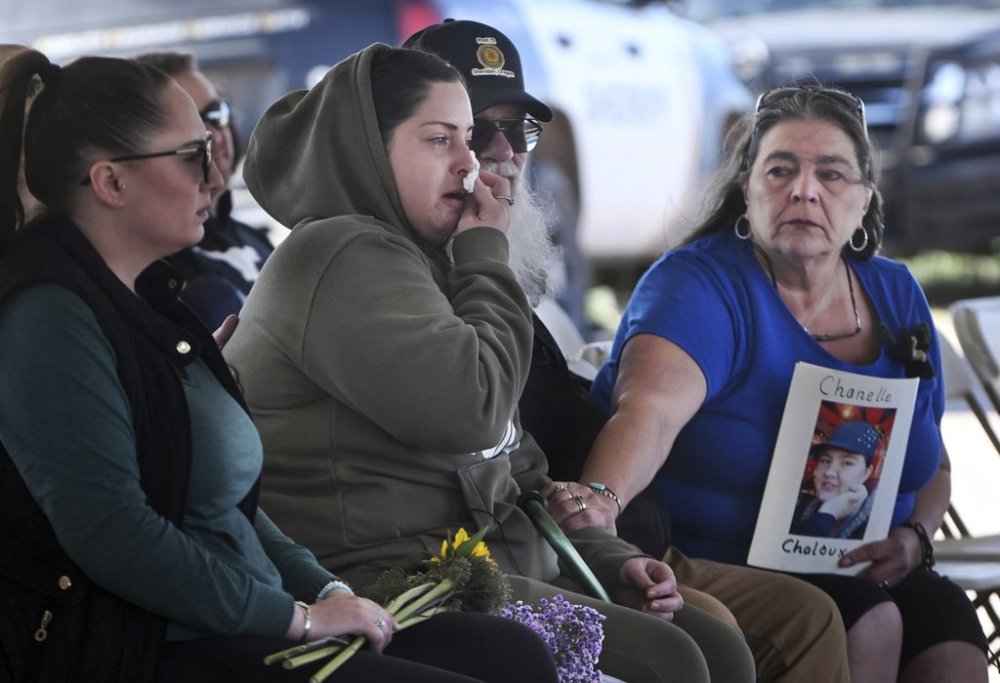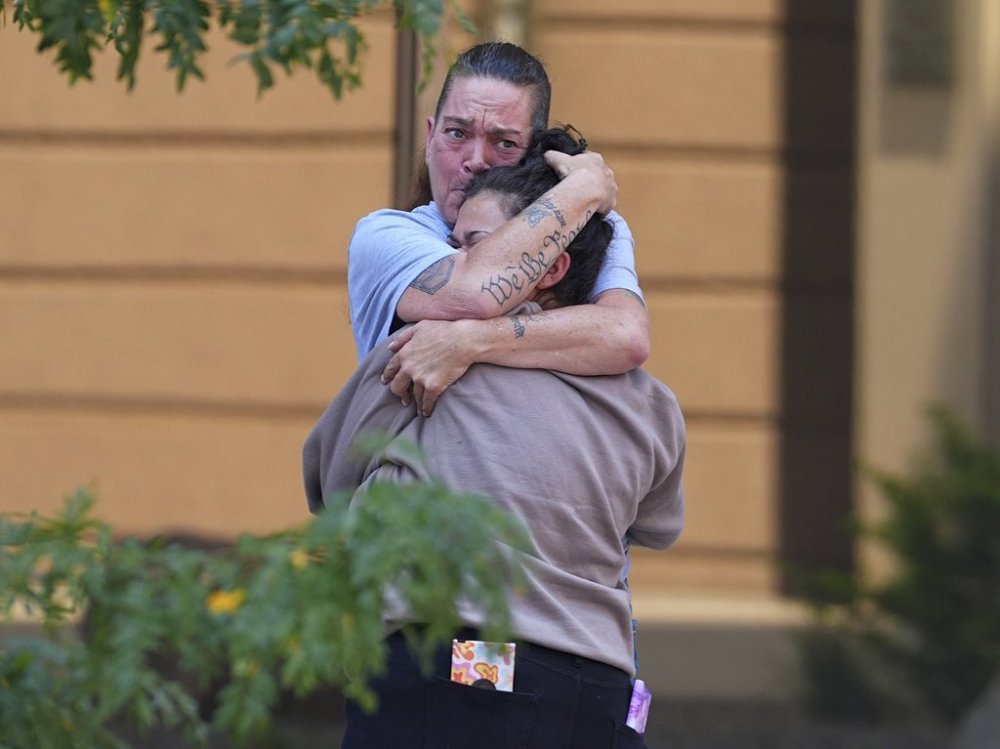Colorado judge rejects plea deal for funeral director who acknowledged abusing 191 corpses
Advertisement
Read this article for free:
or
Already have an account? Log in here »
To continue reading, please subscribe:
Monthly Digital Subscription
$0 for the first 4 weeks*
- Enjoy unlimited reading on winnipegfreepress.com
- Read the E-Edition, our digital replica newspaper
- Access News Break, our award-winning app
- Play interactive puzzles
*No charge for 4 weeks then price increases to the regular rate of $19.00 plus GST every four weeks. Offer available to new and qualified returning subscribers only. Cancel any time.
Monthly Digital Subscription
$4.75/week*
- Enjoy unlimited reading on winnipegfreepress.com
- Read the E-Edition, our digital replica newspaper
- Access News Break, our award-winning app
- Play interactive puzzles
*Billed as $19 plus GST every four weeks. Cancel any time.
To continue reading, please subscribe:
Add Free Press access to your Brandon Sun subscription for only an additional
$1 for the first 4 weeks*
*Your next subscription payment will increase by $1.00 and you will be charged $16.99 plus GST for four weeks. After four weeks, your payment will increase to $23.99 plus GST every four weeks.
Read unlimited articles for free today:
or
Already have an account? Log in here »
COLORADO SPRINGS, Colo. (AP) — A judge on Friday rejected a plea agreement for a Colorado funeral home owner who acknowledged abusing 191 corpses, after family members described the pain and shame they’ve carried since learning their loved ones’ bodies were left to rot.
The rare decision to reject the plea agreement that called for a 20-year prison sentence followed anguished testimony from family members seeking a more severe punishment.
Among them was Crystina Page, whose son David Jaxon Page, 20, was killed by police during a mental health crisis in 2019. His body languished in the funeral home for years as Page carried with her an urn that she wrongly thought contained her son’s cremated ashes.

“I loved it, I cried over it, I held it close during sleepless nights. I kissed him,” Page said. “It wasn’t him at all. … What happened to my son has broken me in ways I cannot repair.”
For four years, Jon Hallford and his wife, Carie, ran a fraudulent scheme from their Return to Nature Funeral Home in Colorado Springs while maintaining a lavish lifestyle. They took money from customers for cremations, only to stash the bodies and give the families dry concrete resembling ashes.
Page and others said the plea agreement would have essentially erased the crimes committed against the 191 people whose bodies were discovered in 2023 in a building in Penrose, Colorado. The agreement said Hallford’s state sentence was to run concurrently with a 20-year federal sentence, meaning he could have been freed many years earlier than if the sentences had run consecutively.
Colorado has struggled to effectively oversee funeral homes and, for many years, had some of the weakest regulations in the nation. It’s had a slew of abuse cases, including an estimated 20 decomposing corpses discovered this week at a funeral home in Pueblo.
Jon Hallford already is bound for prison after pleading guilty to federal fraud charges. The rejection of the plea deal effectively resets the separate state criminal case. Hallford can now withdraw his guilty plea, sending the case to trial. He could also keep his guilty plea and let the judge sentence him without any guarantee of the outcome. He returns to court on Sept. 12.
Defense attorney says trial would not provide families with answers
Some of the victims who filled the court seemed to brace themselves for the judge to accept the deal and then applauded when he announced his decision.
Bentley said he had never rejected a plea agreement in his nine years on the bench and called it an “extreme action by the court.” He suggested he was swayed after listening to Friday’s testimony.
“I heard an overwhelming perception that the justice that had been worked out between the attorneys was justice that did not accurately reflect the truth of the victims’ experiences,” Bentley said.
The prosecutor, Rachael Powell, had argued that a 20-year sentence was appropriate since abuse of a corpse is the least serious type of felony under the law, with a possible sentence ranging from probation to a maximum of up to 18 months in prison.
Defense attorney Adam Steigerwald said a trial would not deliver what family members wanted: answers.
“The answers the people are looking for, sadly, are not satisfactory, and they largely don’t exist,” he said.
Samantha Naranjo, whose grandmother’s body was found at the funeral home over a year after she died, said Bentley acknowledged the experiences of families of the 191 people whose remains were identified — and also of the relatives of the approximately 1,000 additional people whose remains were handled by the funeral home. Bentley said those people are considered potential victims even though the Hallfords were not prosecuted for how their remains were handled.
“I feel heard,” she said as tears welled up in her eyes.

Carie Hallford is accused of the same crimes as her husband and also pleaded guilty. Her sentencing on the corpse abuse charges has not been scheduled.
The couple was accused of letting 189 bodies decay. In two other instances, the wrong bodies were buried. Four remains were yet to be identified, the district attorney’s office said this week.
The Hallfords got a license for their funeral home in 2017, and authorities said the bodies started piling up by 2019. Some decomposed beyond recognition. Others were found unclothed or on the floor in inches of fluid from the bodies.
The Hallfords bought luxury items after defrauding the government
As the gruesome count grew, Jon and Carie Hallford were also defrauding the federal government out of nearly $900,000 in pandemic relief aid.
With the money from families and the federal government, the Hallfords bought luxury goods, a GMC Yukon and Infiniti worth $120,000 combined and $31,000 in cryptocurrency.
In 2023, a putrid smell poured from the building and the police turned up. Investigators swarmed the building, donning hazmat suits and painstakingly extracting the bodies. Hallford and his wife were arrested in Oklahoma, where Jon Hallford had family, more than a month later.
Families learned that their cathartic moments of grief — spreading a mother’s ashes in Hawaii or cradling a son’s urn in a rocking chair — were tainted by a deception. It was as if those signposts of the grieving process had been torn away, unraveling months and years of working through their loved ones’ deaths.
___
Brown reported from Billings, Montana.

